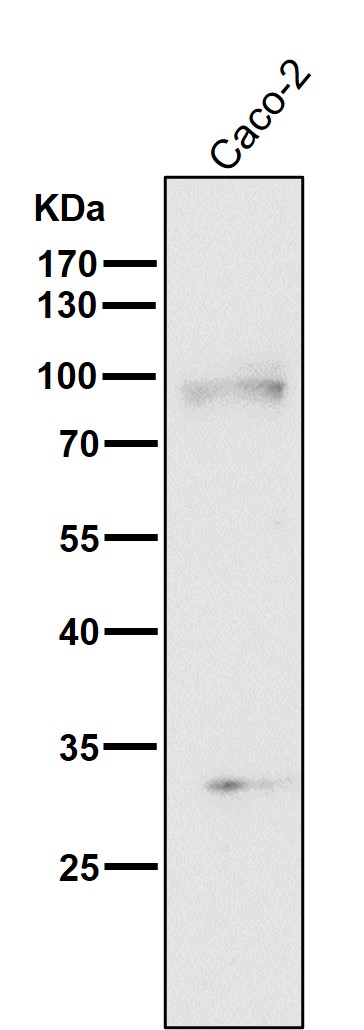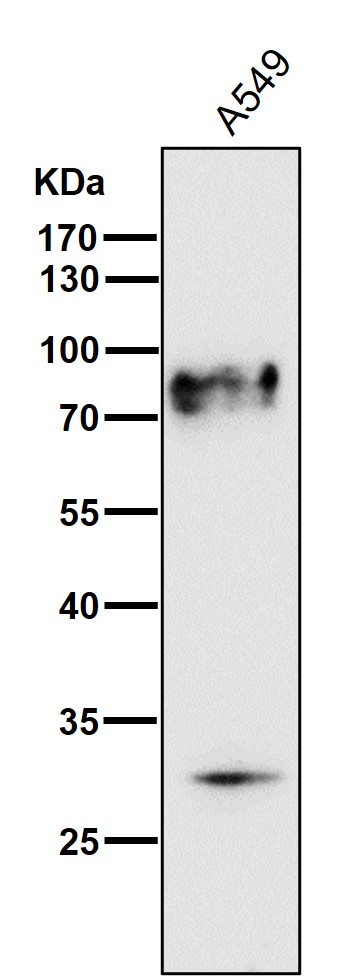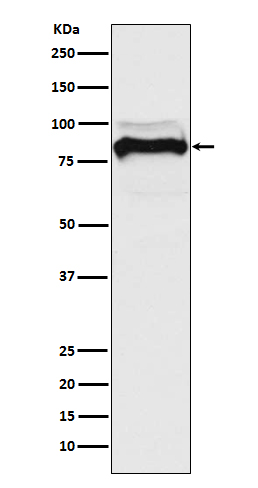


| WB | 咨询技术 | Human,Mouse,Rat |
| IF | 咨询技术 | Human,Mouse,Rat |
| IHC | 咨询技术 | Human,Mouse,Rat |
| ICC | 技术咨询 | Human,Mouse,Rat |
| FCM | 咨询技术 | Human,Mouse,Rat |
| Elisa | 咨询技术 | Human,Mouse,Rat |
| Aliases | TGF-beta receptor type-2; TGFR-2; TGFR2; TGF-beta type II receptor; TbetaR-II; TGFBR2;;TGFR 2 |
| WB Predicted band size | Calculated MW: 65 kDa ; Observed MW: 80 kDa |
| Host/Isotype | Rabbit IgG |
| Antibody Type | Primary antibody |
| Storage | Store at 4°C short term. Aliquot and store at -20°C long term. Avoid freeze/thaw cycles. |
| Species Reactivity | Human |
| Immunogen | A synthesized peptide derived from human TGFR 2 |
| Formulation | Purified antibody in PBS with 0.05% sodium azide,0.05% BSA and 50% glycerol. |
+ +
以下是3篇关于TGFβ受体II(TGFBR2)抗体的代表性文献摘要:
1. **"TGF-β signaling in cancer: control by negative regulators and functional crosstalk with receptor tyrosine kinases"**
*作者:Derynck R, Akhurst RJ*
摘要:探讨了TGFβ受体II(TGFBR2)在肿瘤中的双重作用,包括其作为肿瘤抑制因子和促癌信号的角色,并提及针对TGFBR2的抗体在靶向治疗中的潜在应用。
2. **"Structural basis of TGF-β signaling by the latent TGF-β complex and receptor binding"**
*作者:Massagué J, et al.*
摘要:解析了TGFβ受体II的分子结构及其与配体的结合机制,利用特异性抗体阻断受体功能的研究为靶向治疗提供了理论依据。
3. **"Antibody-mediated blockade of TGFβ receptor II inhibits breast cancer tumorigenesis through an IFNγ-dependent mechanism"**
*作者:Hojo M, et al.*
摘要:通过抗TGFBR2抗体阻断TGFβ信号通路,显著抑制乳腺癌小鼠模型中的肿瘤生长,并揭示了该过程与干扰素γ(IFNγ)激活的免疫应答相关。
4. **"TGF-β signaling in fibrosis and the development of therapeutic antibodies"**
*作者:Pickup M, et al.*
摘要:综述了TGFβ受体II在纤维化疾病中的作用,并总结了多种抗TGFBR2抗体的研发进展及其在抗纤维化治疗中的效果验证。
如需具体文献来源,建议通过PubMed或Google Scholar按标题和作者检索全文。
The TGF-beta receptor type II (TGFβRII) antibody targets a key component of the transforming growth factor-beta (TGF-β) signaling pathway, which regulates diverse cellular processes, including proliferation, differentiation, apoptosis, and immune responses. TGFβRII is a transmembrane serine/threonine kinase receptor that binds TGF-β ligands (e.g., TGF-β1. TGF-β2. TGF-β3) and recruits TGFβRI to form a heteromeric complex, initiating downstream Smad-dependent and non-Smad signaling. Dysregulation of TGFβRII is linked to pathologies such as cancer, fibrosis, and autoimmune diseases.
TGFβRII antibodies are widely used in research to study receptor expression, localization, and signaling dynamics. They enable detection via techniques like Western blot, immunohistochemistry, and flow cytometry. Some antibodies block receptor-ligand interactions, serving as tools to inhibit TGF-β signaling in experimental models. Clinically, TGFβRII-targeting antibodies are explored for therapeutic applications, particularly in cancers where TGF-β promotes metastasis or immunosuppression, and in fibrotic disorders to counteract excessive tissue remodeling. Variants include monoclonal antibodies for specificity and recombinant antibodies for reduced immunogenicity. Their development faces challenges related to balancing pathway inhibition with off-target effects, given TGF-β's dual tumor-suppressive and pro-oncogenic roles.
×